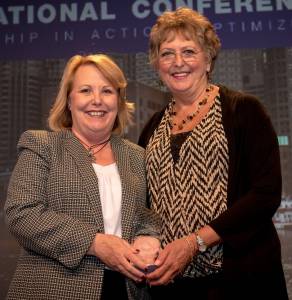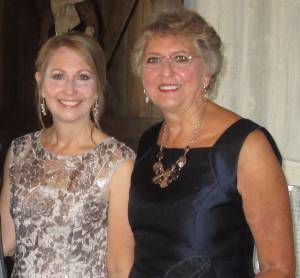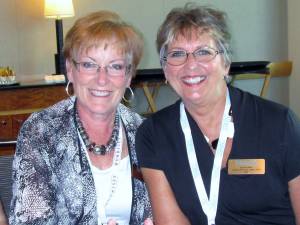
Carole is inducted into the NAMSS Hall of Fame
There’s a reason that Carole LaPine, MSA, CPMSM®, CPCS®, was one of the first two MSPs inducted into the NAMSS Hall of Fame. Actually, there are several reasons, all revolving around LaPine’s relentless commitment to excellence. The accolade she received in 2016 was the culmination of a career spent serving the profession and organization that she cherished.
Yet, like many others who assumed the mantle of MSP leadership, LaPine’s career had humble beginnings. Her first position was a secretary in the Department of Pediatrics at the University of Michigan. “When my boss advanced to becoming the first Chief of Clinical Affairs, I went with him,” she recalls. There, she delved into the credentialing process. “Even though physicians were employed by the medical school, they had to go through credentialing to work in the hospital,” she says. “That was quite controversial, and I was not popular.”
Finding Her People
While Carole LaPine initially felt alone, she soon discovered Michigan Association Medical Staff Services. “I didn’t know there were other people out there in the world,” she says. Her first NAMSS conference in Las Vegas was an eye-opener. “I was so in awe of the concept of a thousand people coming together doing the same kind of work, and who are communicating and networking,” she remembers. She was also awestruck by those in leadership who spoke comfortably from the stage. “Little did I know that this would later be my path.”

Carole and her daughter, Suzy
Her experience at that NAMSS conference spurred LaPine to become more involved. At the time, NAMSS was developing certification programs. One thing led to another, and eventually LaPine chaired the NAMSS Certification Board from 2003 to 2006. She recalls conducting an exam review and attending a talk at the National Organization for Competency Assurance. “I listened to a speaker describe the process of designing a certification program for crane operators based on a job task analysis,” she says. She found the idea of analyzing skill sets needed to be successful in your job compelling, and spearheaded conducting a job task analysis for MSPs. Out of that grew the original CPMSM® certification.
In 2007, LaPine became president of the organization. During her tenure, NAMSS changed both management companies and executive directors. LaPine remembers that one of the organization’s growing pains was the transition from volunteer conference staff to the management company’s conference staff. “It was really hard to step away from the hands-on work that we did so well,” she says. “NAMSS lost some of its personality when we no longer got to talk to people as they registered.”
Nonetheless, her involvement in NAMSS was truly rewarding. “Being part of NAMSS was such a wonderful experience,” she says. “It’s incredible to have such an organization supporting our work.”
Ramping Up Her Career

Carole and Jan O’Hair
While Carole LaPine was moving through the ranks of NAMSS, she was also ramping up her career. She moved from the University of Michigan to become the medical staff coordinator at nearby St. Joseph Mercy Health System. “Moving from an academic to community setting gave me a different feel for physicians,” she says. “In academia, it’s publish or perish, while the community setting emphasizes being patient-friendly – which was more comfortable for me.”
Always one to step through doors of opportunity, LaPine tried her hand at being a pharmaceutical representative. “It was an eye-opener for me, and I only lasted four months,” she recalls with a chuckle. From there, LaPine turned her focus to the world of physician organizations, where she was able to achieve exceptional reimbursement rates from insurance companies. Once the healthcare industry’s reimbursement framework shifted to unsustainable capitation rates, however, she moved back to St. Joseph Mercy Health Systems.
From there, LaPine made the leap to the corporate office of Trinity Health, where she was director of medical staff services for 49 hospitals. “The first year, I thought I’d lost my mind,” she says. “I had all of the responsibility and none of the authority, plus everyone thought I was a traitor because I’d gone to the corporate world.”
LaPine shrugged off the doubters and made her mark by accomplishing projects such as standardizing bylaws across the system and developing criteria to measure competence in specific privileges. “While many hospitals didn’t want to lose their independence, there was no need to reinvent the wheel,” she says. “Providing templates and allowing them to choose the best fit was such a big help to all of those 49 hospitals.”
When Trinity Health merged with another healthcare system in Chicago, the result was 7,000 duplicate positions – including LaPine’s. “Since I was living in Florida at the time, it made sense that my position could be eliminated,” she says. Reflecting on her career, LaPine says, “Truly, I loved the job and the work that we did, and especially the role that we played in patient safety.”
Enjoying Her Retirement

Carole and Mike featured on the cover of their retirement community’s magazine
In retrospect, Carole LaPine wonders how she managed to hold down a full-time job while accomplishing so much on behalf of the profession. She bestows much of the credit on her husband, Mike, and her two children. “The support of my family through my State and NAMSS involvement was very helpful,” she says. “I couldn’t have done it without that support.”
Today, LaPine’s life is filled with hobbies and volunteering. She works with Dolls from the Heart to make 100 to 200 dolls each month for hospitalized children and seniors with Alzheimer’s disease. At the start of the pandemic, she sewed 300 masks for Shriners Healthcare. In between, she manages to fit in quilting, reading, board games, water walking, and educational enrichment. “I’m an avid learner, a perpetual student,” LaPine says.
Education is something she wishes she would have emphasized earlier in her life, having achieved her bachelor’s and master’s degrees while working full-time. “I would have done it differently if I’d had the opportunity and the courage,” she says. LaPine eventually realized that education was key to her success. “I discovered that, if I’m working with highly educated people and want to be recognized, I need to step up my game, too.”

